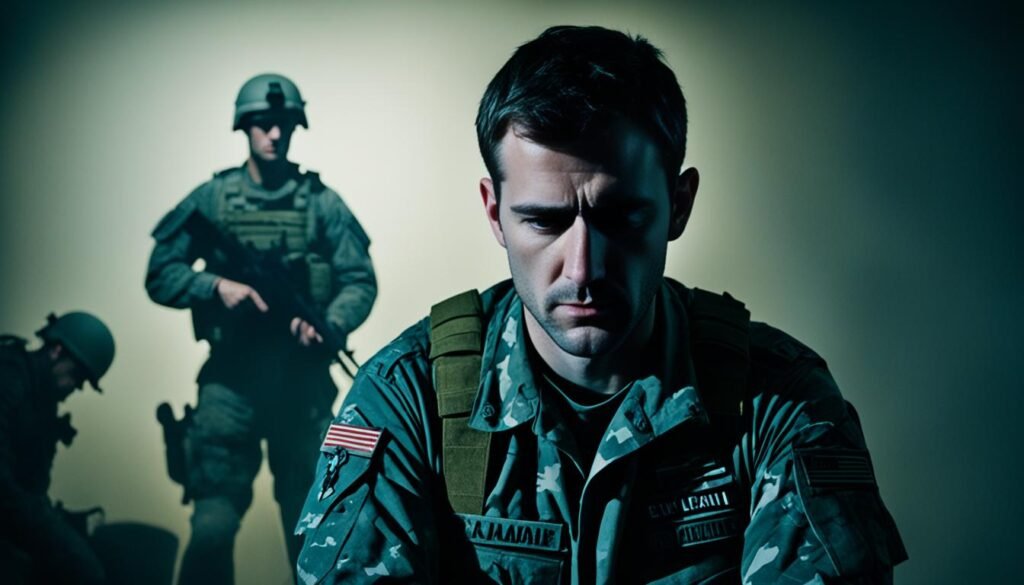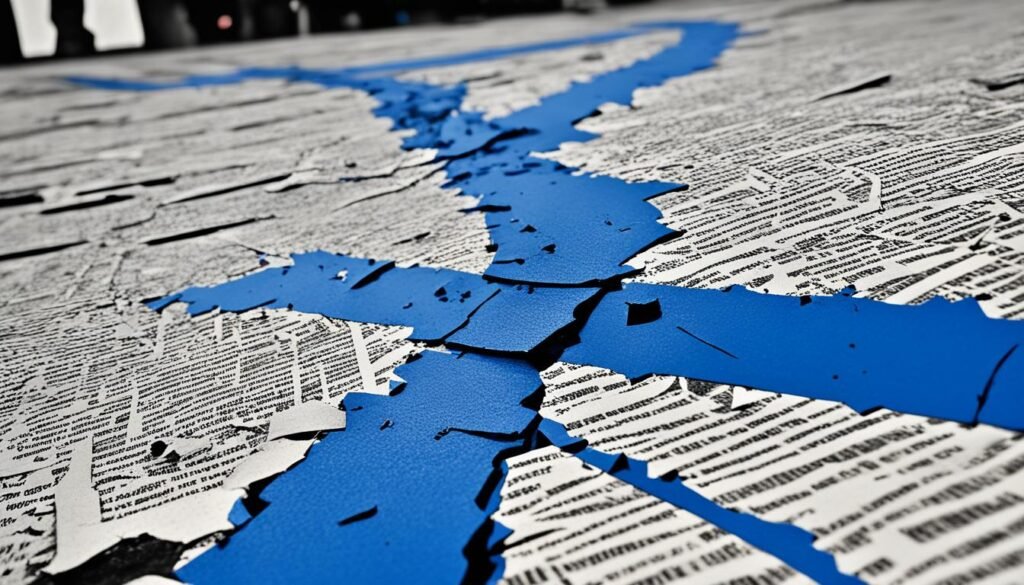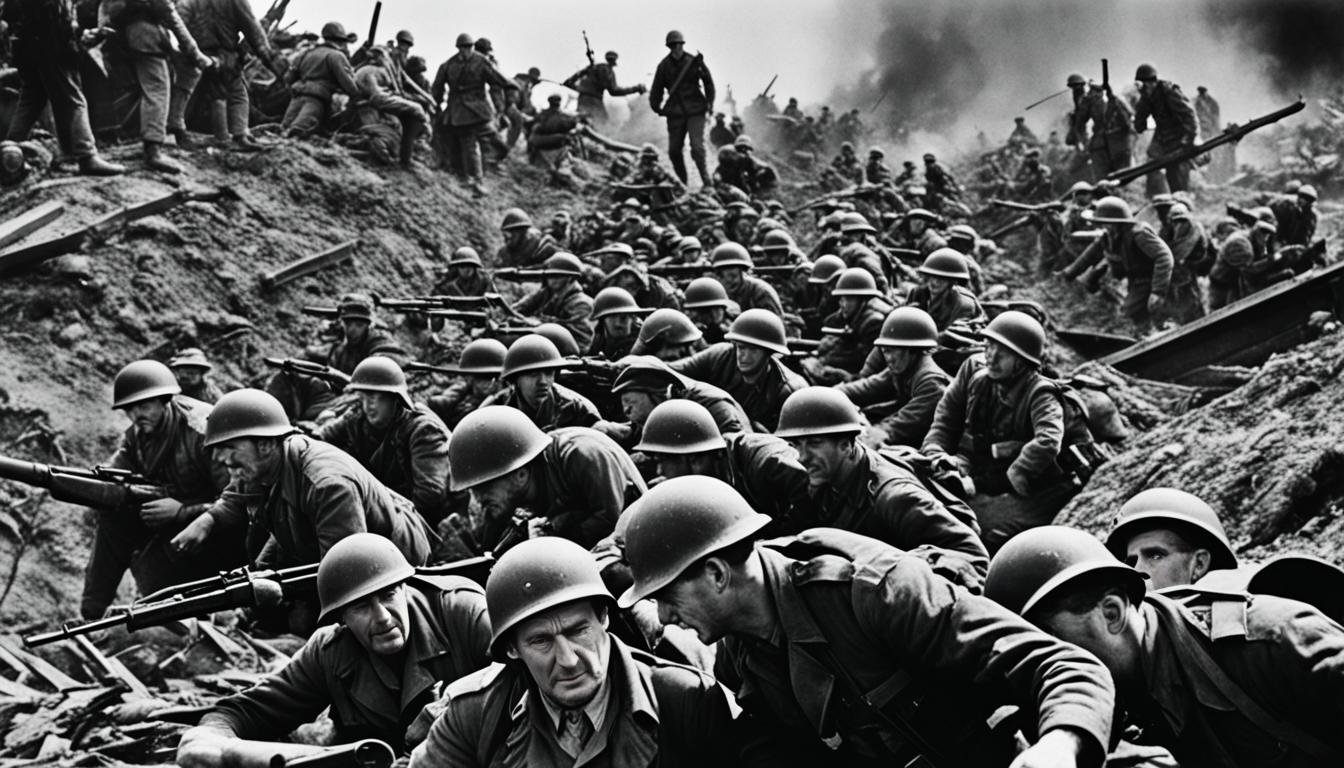World War II was a pivotal moment in history that shaped the world we live in today. To truly understand the impact and significance of this global conflict, it is essential to explore the personal stories, historical accounts, and lasting legacies left behind. That’s where documentaries play a crucial role, offering deep insights and a unique perspective on World War II.
In this article, we will explore the best World War II documentaries that take you on a journey through this transformative period in human history. From gripping personal narratives to shocking revelations, these films shed light on the untold stories, the heroes, and the horrors of World War II.
Table of Contents
ToggleKey Takeaways:
- Discover the most impactful and must-watch World War II documentaries.
- Gain a unique perspective on the global conflict and its profound impact.
- Explore the personal experiences and sacrifices of individuals during World War II.
- Uncover the untold stories and hidden aspects of this historic period.
- Deepen your understanding of the lasting legacies of World War II and its implications in the present.
Jan Karski: A Heroic Witness of the Holocaust
Jan Karski was a Polish witness of the Holocaust and a true hero of World War II. His efforts to alert the world to the genocide taking place and his role as a messenger for both the Polish and Jewish people are the subject of a powerful documentary.
This film provides an in-depth look into Karski’s life and work, showcasing his bravery and determination in the face of unimaginable horrors. Through powerful performances and behind-the-scenes insights, viewers are transported back in time to witness Karski’s heroic actions and the impact they had on the world.
Jan Karski risked his life to deliver first-hand accounts of the Holocaust, ensuring that the voices of those affected by this horrific event were heard.
This documentary sheds light on the significant role Karski played as a witness of the Holocaust, providing invaluable testimony that continues to shape our understanding of this dark period in history. Through his courage and determination, Karski became a symbol of resistance and a beacon of hope amidst the atrocities of World War II.
Jan Karski: The Messenger of Truth
Jan Karski’s mission was to alert the world to the atrocities committed during the Holocaust. As a Polish courier and intelligence officer, he risked his life to gather evidence of the genocide and personally deliver his reports to influential leaders, including President Franklin D. Roosevelt and British Foreign Secretary Anthony Eden.
Karski’s eyewitness accounts provided crucial information about the mass extermination of Jews and other persecuted groups. Despite the disbelief and apathy he encountered, his determination to expose the truth never wavered.
This documentary captures the essence of Karski’s courage and the immense sacrifices he made to ensure that the world knew about the Holocaust. By sharing Karski’s story, this film pays tribute to his legacy as a true World War II hero, reminding us of the importance of bearing witness to history’s darkest moments.
| Key Aspects | Impact |
|---|---|
| Jan Karski’s eyewitness testimonies | Enlightened world leaders and public about the Holocaust |
| Karski’s role as a messenger | Influenced global perception and response to the Holocaust |
| Personal sacrifices and risks taken | Inspired generations with his bravery and resilience |
Let There Be Light: Exploring PTSD in World War II Veterans
In the documentary Let There Be Light, we delve into the psychological wounds of war and the prevalence of post-traumatic stress disorder (PTSD) among World War II veterans. This powerful film takes an unscripted approach, using raw interviews and following a group of patients as they undergo psychiatric treatment.
The impact of war on the mental health of individuals is a topic often overlooked, but Let There Be Light brings it to the forefront. Through the personal stories shared by the veterans themselves, we gain a deeper understanding of the lasting effects of combat on their well-being.
The documentary Let There Be Light provides a groundbreaking look into the lives of World War II veterans, shedding light on the lasting impact of war and the importance of proper care and understanding when it comes to mental health.
PTSD is a condition that affects many veterans, but during World War II, it was poorly understood and went largely untreated. Let There Be Light offers a unique insight into the struggles faced by these brave individuals and the challenges they had to overcome.
The film highlights the importance of providing support and resources for veterans, both during and after their service. It serves as a reminder that the battle doesn’t always end on the battlefield and that mental health care is crucial for those who have experienced the traumas of war.

Let There Be Light is a poignant and thought-provoking documentary that gives us a glimpse into the lives of World War II veterans. It raises awareness about the long-lasting effects of war and emphasizes the need for compassionate care and understanding for those who have served.
Bowling for Columbine: Examining the Impact of Violence
The documentary “Bowling for Columbine” takes a critical look at the causes and consequences of the tragic 1999 mass shooting at Columbine High School. Directed by Michael Moore, this thought-provoking film explores America’s gun culture, media influence, and societal factors that contribute to acts of violence.
With a focus on the Columbine shooting as a case study, the film raises important questions about the root causes of such tragedies and challenges viewers to reevaluate their understanding of violence in society. Moore delves into the broader implications of the event, calling into question America’s obsession with guns, its history of violent crime, and its deeply rooted cultural norms.
Through interviews and investigative journalism, Moore presents a compelling narrative that highlights the systemic issues surrounding gun violence in the United States. He examines the availability of firearms, the role of the media in perpetuating fear and paranoia, and the impact of socio-economic factors on crime rates.
“The film challenges viewers to confront uncomfortable truths about the influence of violence on American society and prompts us to reflect on our own contributions to a culture of fear and aggression.”
Bowling for Columbine offers a powerful, eye-opening documentary experience that aims to spark conversations and inspire change. By shining a light on the devastating impact of violence, this film serves as a call to action for individuals and communities to work towards a safer and more compassionate world.
Shoah: Uncovering the Horrors of the Holocaust
The documentary “Shoah” is a groundbreaking exploration of the Holocaust, offering a profound and unflinching look into the atrocities committed during World War II. Through a series of interviews with Polish survivors, bystanders, and perpetrators, the film provides a powerful testimony to the depths of human suffering and the lasting impact of this dark chapter in history.
The interviews in “Shoah” reveal the experiences and memories of those directly affected by the genocide, allowing audiences to gain a deeper understanding of the Holocaust’s scale and significance. The film serves as a crucial historical document, preserving the stories of Polish survivors and shedding light on the true horrors they endured.
The Voices of Polish Survivors
The testimonies of Polish survivors in “Shoah” provide invaluable insights into the Holocaust. These individuals courageously share their personal accounts of suffering, resilience, and loss, ensuring that the memories of the victims are not forgotten. Their voices serve as a reminder of the immense human tragedy that occurred and the urgent need to prevent such atrocities from happening again.
“I saw things that I could never forget. The pain, the fear, the loss… It is important for the world to know what happened, to learn from our past mistakes.” – Holocaust Survivor
A Historical Document of Immense Significance
As a documentary, “Shoah” goes beyond mere entertainment and serves as a vital historical document. The painstaking research, interviews, and storytelling techniques employed in the film ensure that the Holocaust is not reduced to a mere statistic but honored as a monumental tragedy that forever changed the world.
The existence of “Shoah” allows future generations to hear firsthand accounts from those who experienced the Holocaust, preserving their stories for years to come. It serves as a powerful reminder of the importance of remembrance, education, and empathy in the face of history’s darkest moments.
| Key Takeaways |
|---|
| ⢠“Shoah” is a groundbreaking documentary that uncovers the horrors of the Holocaust. |
| ⢠The film features interviews with Polish survivors, bystanders, and perpetrators. |
| ⢠The testimonies provide invaluable insights into the experiences and memories of those affected by the genocide. |
| ⢠“Shoah” serves as a crucial historical document, preserving the stories of Polish survivors and ensuring the Holocaust is not forgotten. |
| ⢠The documentary emphasizes the need for remembrance, education, and empathy to prevent such atrocities in the future. |
Night and Fog: A Haunting Portrait of Auschwitz
The documentary “Night and Fog” offers a profound portrayal of the Auschwitz concentration camp, serving as a vivid reminder of the atrocities committed during the Holocaust. Through a combination of present-day footage, archival materials, and compelling narration, the film takes viewers on a haunting journey into the heart of this infamous site.
The film meticulously reveals the aftermath of the Nazi atrocities, showcasing the desolate landscapes and the remnants of the camp’s structures. The juxtaposition of past and present illustrates the stark contrast between the horrors of the past and the present state of the camp.
“Night and Fog” skillfully weaves historical documentation, survivor testimonies, and powerful imagery to explore the enduring legacy of the Holocaust. The film implores audiences to remember the victims, giving their voices and experiences the recognition they deserve.
By immersing viewers in the bleak reality of Auschwitz, “Night and Fog” serves as a powerful educational tool, ensuring that the lessons of the Holocaust are not forgotten. It evokes a profound sense of empathy and demands that we confront the darkest depths of human cruelty.
The Enduring Legacy of Auschwitz
The documentary effectively captures the enduring legacy of Auschwitz, moving beyond mere historical accounts to illuminate the human stories that unfolded within its walls. Through survivor testimonies and intimate personal narratives, the film humanizes the victims and survivors, challenging us to confront the unimaginable horrors they endured.
This haunting portrayal of Auschwitz serves as a solemn reminder of the importance of remembrance and education. It compels us to reflect on the consequences of hatred, intolerance, and indifference, steering us towards a future where such atrocities never recur.
The Thin Blue Line: Challenging the Concept of Truth
This section highlights the documentary “The Thin Blue Line”, directed by Errol Morris, which delves into the case of a murdered police officer and ignites a profound examination of truth and justice. Through innovative reenactments and narrative techniques typically associated with fictional crime dramas, the film skillfully blurs the line between fact and fiction, inviting viewers to question the reliability of eyewitness testimony and the complexities of the justice system.
“The Thin Blue Line is not a whodunit film. It’s about what could go wrong in a justice system when the search for the truth becomes compromised.”
– Errol Morris, Director
The film meticulously constructs multiple perspectives, weaving together interviews, archival footage, and expert analysis to challenge the established narrative of the case and expose the flaws within the legal process. It delves into the power of storytelling and its influence on shaping our understanding of events, raising crucial questions about the nature of truth and the consequences of incomplete investigations.
Reevaluating Truth and Justice
The Thin Blue Line compels viewers to confront the inherent subjectivity of truth and the potential for wrongful convictions. By scrutinizing the actions of law enforcement, the film invites a critical examination of the justice system’s fallibility and the potential for bias, highlighting the need for rigorous investigative procedures and the importance of corroborating evidence.

The Power of Storytelling
Through its masterful storytelling techniques, The Thin Blue Line demonstrates the profound impact of narratives on shaping our perception of events. The film highlights the role of subjective storytelling in criminal cases and the potential for manipulation of facts, emphasizing the responsibility of both filmmakers and the legal system to seek the truth and strive for justice.
A Lasting Impact
The Thin Blue Line’s groundbreaking approach to true-crime documentaries has made it a seminal work in the genre. Its influence can be seen in subsequent films and series that challenge conventional narrative structures and explore the complex intricacies of real-life crime stories.
Conclusion
In conclusion, these best World War II documentaries provide a captivating and enlightening exploration of the global conflict and its aftermath. Each film offers a unique perspective and sheds light on different aspects of the war, leaving viewers with a deep understanding of the impact it had on individuals and society.
From the heroic witness of the Holocaust, Jan Karski, in his namesake documentary, to the thought-provoking examination of violence in “Bowling for Columbine”, these films invite viewers to reflect on the past and draw connections to the present.
The haunting and powerful portrayals of the Holocaust in “Shoah”, “Night and Fog”, and “The Thin Blue Line” serve as important historical documents that preserve the memories of those affected by the atrocities committed during World War II.
For anyone seeking a deeper understanding of World War II and its legacy, these must-watch documentaries prove to be among the greatest and most popular films in the genre. They provide an immersive experience that transcends the boundaries of time, ensuring that the lessons and sacrifices of that era are never forgotten.
FAQ
What are the best World War II documentaries to watch?
The top World War II documentaries include “Jan Karski: A Heroic Witness of the Holocaust,” “Let There Be Light: Exploring PTSD in World War II Veterans,” “Bowling for Columbine: Examining the Impact of Violence,” “Shoah: Uncovering the Horrors of the Holocaust,” “Night and Fog: A Haunting Portrait of Auschwitz,” and “The Thin Blue Line: Challenging the Concept of Truth.”
Who is Jan Karski and why is he considered a hero of World War II?
Jan Karski was a Polish witness of the Holocaust who played a crucial role in alerting the world to the genocide taking place during World War II. He served as a messenger, carrying vital information about the atrocities committed by the Nazis to various governments. His heroic efforts to bring attention to the Holocaust and advocate for the Polish and Jewish people make him an important figure in World War II history.
What does the documentary “Let There Be Light” explore?
“Let There Be Light” delves into the psychological wounds of war, focusing on the prevalence of post-traumatic stress disorder (PTSD) among World War II veterans. The film features unscripted interviews and follows a group of patients undergoing psychiatric treatment. It provides a groundbreaking look into the impact of war on mental health, emphasizing the need for proper care and understanding of veterans.
What themes does the documentary “Bowling for Columbine” address?
“Bowling for Columbine” explores the causes and consequences of the 1999 mass shooting at Columbine High School. The film critically examines America’s gun culture, media influence, and societal factors that contribute to acts of violence. It raises important questions about the root causes of such tragedies and challenges viewers to reconsider their understanding of violence in society.
What does the documentary “Shoah” focus on?
“Shoah” is a groundbreaking exploration of the Holocaust. The film consists of interviews with Polish survivors, bystanders, and perpetrators, offering an unparalleled look into the experiences and memories of those affected by the genocide. It serves as a powerful testimony to the atrocities committed during World War II and is considered a crucial historical document.
What does the documentary “Night and Fog” portray?
“Night and Fog” provides a haunting portrayal of the Auschwitz concentration camp. Through present-day footage, archival materials, and narration, the film depicts the aftermath of the Nazi atrocities and reflects on the enduring legacy of the Holocaust. It serves as a powerful reminder of the horrors of Auschwitz and the importance of remembering the victims.
What is the focus of the documentary “The Thin Blue Line”?
“The Thin Blue Line,” directed by Errol Morris, investigates the case of a murdered police officer and raises questions about the nature of truth and justice. The film utilizes reenactments and narrative techniques typically associated with fictional crime dramas, blurring the line between fact and fiction. It explores the complexities of the justice system and the power of storytelling in shaping our understanding of events.
- How Terry Crews and Rebecca King-Crews Redefined Relationship Goals - 3 January 2025
- Angel Reese’s New Year’s Eve Outfit 2025: A Fashion Statement to Remember - 3 January 2025
- Angelina Jolie Net Worth: $120 Million Empire-Movies, Mansions, and More - 31 December 2024

